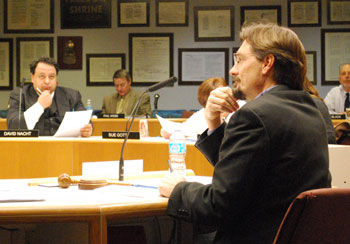AATA OKs Labor, Agency Fee Accords
Ann Arbor Transportation Authority board meeting (Jan. 17, 2013): Despite the passage of a right-to-work law by the Michigan legislature in late 2012, a new agreement between the AATA and Transport Workers Union Local 171 (TWU) maintains the same kind of agency fees that the legislation eliminated.

At right: Charles Griffith, chair of the Ann Arbor Transportation Authority board. On the left is board member David Nacht. (Photo by the writer.)
The AATA board ratified the 10-year agreement on agency fees in an accord that is separate from a 4.5-year agreement covering wages and benefits. The board approved both agreements at its Jan. 17 meeting. The agreement on agency fees takes advantage of the fact that the right-to-work law does not take effect until late March, and thus does not apply to agreements that are in place before then. It appears to be a strategy that employers statewide might use as a response to right-to-work, to the extent that they are willing to continue current agency fee arrangements. Agency fees are paid by non-union members based on the idea that they benefit from the union’s representation of their interests during collective bargaining.
The board’s vote on the two labor agreements was not unanimous. Eli Cooper dissented, based at least in part on the fact that the text of the two agreements was not available to all board members before they were asked to vote. David Nacht expressed support for Cooper’s point, but joined other board members in voting for the agreements.
Another vote that did not achieve unanimous support came on a resolution that expressed an intent to work with the board of the newly created southeast Michigan regional transportation authority (RTA) – which includes the counties of Washtenaw, Wayne, Macomb and Oakland, as well as the city of Detroit. The AATA board ultimately voted to table the resolution, with Jesse Bernstein and Anya Dale dissenting. Board members who were in favor of tabling felt that such a resolution was somewhat premature, pending the possible amendment of the RTA legislation, which passed late last year during the lame duck session of the state legislature.
The amendment desired by the AATA – which is supported by the Ann Arbor city council, the Washtenaw County board of commissioners, and the Michigan Public Transit Association – is for Washtenaw County to be excluded from the RTA at this time. AATA board discussion indicated that the window of opportunity for amending the legislation is likely to be the 90-day period for appointing RTA board members, which will close in mid-March.
In other business, the AATA board adopted a revised policy to be used in responding to requests made under the Freedom of Information Act. The board also adopted its categorical and capital grant program through fiscal 2017.
The treasurer’s report indicated a disparity between increasing ridership numbers and the amount of passenger fare revenue – a difference that is significant enough to warrant further inquiry.
Public commentary at the meeting featured a voice that was new to AATA board meetings but familiar as the film critic of the now defunct Ann Arbor News – Christopher Potter. Potter praised the quality of AATA’s service, but asked for weekend buses to run later than they do. [Full Story]



